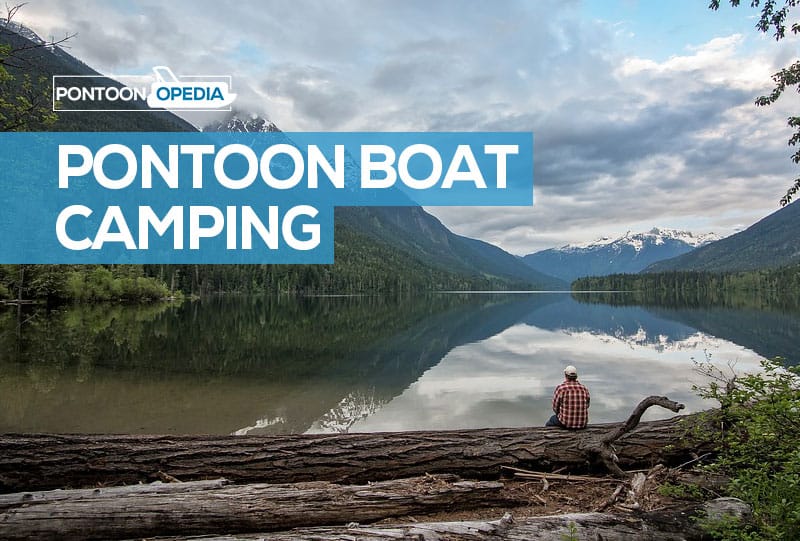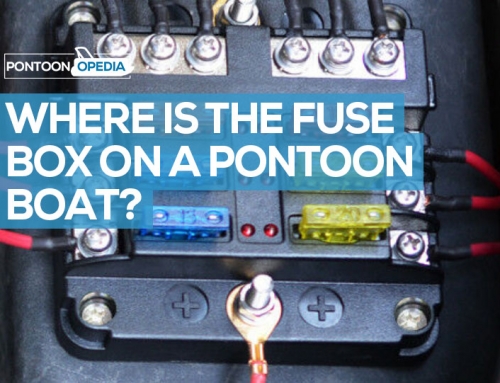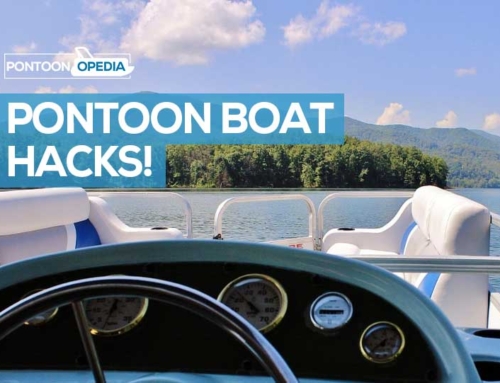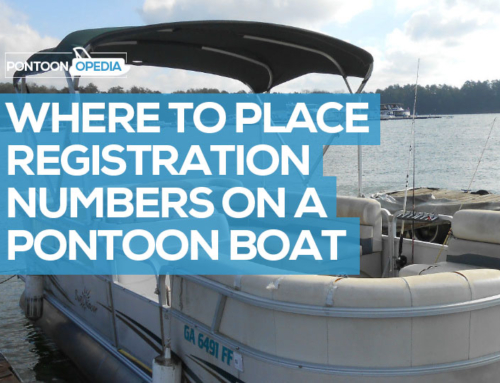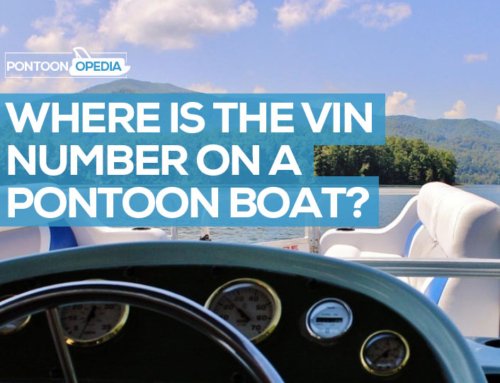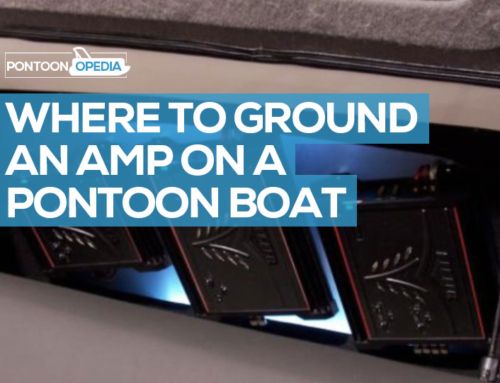Do you love the sight of the sky at night, the stars twinkling in the blackness? Do you find it easiest to fall asleep to the outdoor sounds of crickets and critters and maybe even to the movement of a body of water?
If you answered yes to both those questions, then you might be interested in pontoon boat camping (either on it, or next to it). My family and I will often head off with our pontoon boat camping enclosure (I recommend which one further down) or will often just pitch a tent on a quiet beach.
In this guide I am going to explain what pontoon boat camping package we use, including the enclosure and cover, accessories, tents, and then a guide on how to do it and what to expect. I want you to enjoy your camping experience as much as possible, learning from the mistakes we’ve made!
First of all, let me show you what enclosure and cover we use, as this will be the most important aspect for the whole trip.
Table of Contents
Our pontoon boat camper enclosure
We didn’t spend huge amounts on our pontoon boat camping enclosure, and in truth, you don’t really need to if you’re like us. We tend to camp perhaps 2 or 3 times a year from our pontoon boat, and often like to pitch up a beach instead – but you can do the two things in tandem.
I will often set it up by using a pontoon boat camping enclosure I bought on Amazon. It’s a Taylor Made product as it pretty universal for most boats. Search on Amazon though, as there are different styles available.
Our enclosure is about the right size for just me and my wife to sleep under with sleeping bags. If we take the kids with us, we let them sleep under the camping enclosure, with my wife and I sleeping in a tent on the beach.
Are pontoon boat camping enclosures worth it?
With the wide-open design, high railings and no roof, enclosures can be a great choice for privacy and limited protection from the elements. For that reason, some pontoon enthusiasts opt for an enclosure, or a fabric cover that’s custom fit to your boat. This puts a roof over your head and provides walls as well.
You could shell out hundreds and hundreds of dollars depending on the size of your pontoon camping enclosure and the retailer you choose – some will be custom made. While custom fitted ones aren’t a cheap addition, I’d still say an enclosure is worth considering. For me though, buying a cheap enclosure on Amazon was all we need.
Compare this to camping on the beach, and yes, you’re sacrificing the beauty of sleeping in nature, but you will feel safer with an enclosure attached to your pontoon boat. Plus, any heater you use will work more efficiently since the enclosure will trap in more heat.
However, most pontoon boat camping enclosures offer little to no protection from inclement weather. They’re only made of fabric, not anything sturdy or hard.
Heavy winds can blow your enclosure away and rains will soak it.
Based on that, planning is key, so make sure you check the forecasts before you go!
Will a Bimini work just as well for camping?
I’ve seen other pontooners simply camping out using their Bimini for protection. That’s fine, but you need guaranteed good weather due to the lack of walls, plus need to appreciate you won’t get the same level of privacy that an enclosure offers.
Handy Hint: For advice on what Biminis I recommend for pontoon boat camping, check out my Bimini price guide.
Pontoon boat camping package and accessories
If you do decide to buy a camping enclosure, you don’t just stop there. Below is everything that I have bought and used for the ideal pontoon boat camping package, with reasons why they are all so important.
Here’s a quick list first, as you might already have a lot of these accessories. If you don’t, I go into more detail further down.
Pontoon boat camping accessories
- Lanterns
- Porta-potty (see my recommended toilet set-up)
- Bug repellant
- Beach anchor
- VHF radio
- Flares
- First aid kit
- Life vests
- Space heater
- French water supply
- Sleeping bags
- Inflatable dinghy boat
- Grill for cooking
If you’re thinking of going pontoon boat camping for the first time, this is the guide you want to read. Not only will I provide Amazon links to the above recommended items, but will also share tips, guidance, and advice for your first overnight trip on the water.
The essentials I recommend
As I said, you probably already have a lot of these camping accessories, so I am only recommended the ones I think are completely essential – all of which we use on our own camping trips.
1. Porta-Potty and toilet enclosure
When nature calls and you on your pontoon, you might not have the opportunity to go in complete privacy. The one we use measures 15 inches deep, 13.4 inches wide, and 12.2 inches tall.
Available in a bright white plastic, our marine toilet has a wastewater tank capacity of 2.6 gallons and a freshwater tank capacity that’s also 2.6 gallons. That’s more than generous for an overnight trip.
You might also want to consider a zip up tent to give you complete privacy.
I’ve detailed all the gear you need in this guide to setting up a pontoon toilet.
2. Lanterns
Should you need to use the bathroom or check your pontoon boat in the middle of the night, you’ll be glad you have these LED camping lanterns from Vont (see Amazon prices).
You get four camping lanterns with your order, so each of your passengers can have one.
The lanterns are made of materials that are not only marine-grade, but aircraft-grade as well. Should you plunk the lantern in water, it will survive. The same is true if you were to drop it from 10 feet up onto dry land.
Vont made their LED lanterns to be lightweight and portable. They also collapse so they don’t take up valuable room in your bag. Each lantern boasts 30 LED lights and is powered by a battery with an average life of 30 hours.
3. Bug Repellant
No one wants to waste a relaxing night camping on a pontoon boat swatting at flies, gnats, and other insects.
We use both a repellant in lotion form plus as a spray. It will give you the protection you need from sand flies, chiggers, gnats, and biting flies.
You might also be interested in my guide to keeping flies off your boat. It’s an essential read for any boater planning a camping trip.
4. VHF Radio
Don’t ever lose contact with the outside world when you have a VHF radio. If you’re out of cell phone coverage it could be a life saver. I use this two-way radio on Amazon. It’s handheld and lets you access channels from Canada, international waters, and the United States.
It will hone into channels that may have live activity, so you don’t have to waste valuable time searching for these yourself.
You can adjust the wattage between one watt, 2.5 watts, and five watts as needed. By increasing wattage, you’ll get more transmission power. When you lower the wattage, you save battery life, which is also handy.
The JIS8 waterproof rating means you can even submerge this VHF radio without it failing on you.
5. Flares / strong light
Should your pontoon boat crash, run out of gas, or otherwise stop working, you need to let someone know. At night time especially, something like this strong LED light on Amazon is your new best friend. This flare is an Amazon’s Choice product as well.
The loop and hook as well as an included lanyard cord make it easy to keep this flare close by should you need it. When powered on, the powerful LED light provides 3.4 miles of bright illumination, which is about 2.4 more nautical miles than the US Coast Guard insists on.
The LED bulb, which UST says is “unbreakable,” will last for 17 hours on average before you need to change out the batteries. This flare runs on two AAA batteries. It measures an inch wide and 4.95 inches long.
The See-Me has an IPX7 waterproof rating so even if it sinks a meter deep in the water, it won’t stop working. You can choose from strobe or steady-on features for this LED.
6. First aid kit
You may cross your fingers and your toes for no incidents on your pontoon boat, but you can’t help what happens when camping. You should always be ready for all eventualities, taking a marine first aid kit (see on Amazon).
This one is recommended for outdoor activities like hiking, camping, and backpacking, with all the pieces being approved by the FDA. Included are more than 100 items, such as:
- Tweezers
- Triangular and crepe bandages
- Sting relief wipes
- Splinter probes
- Nitrile gloves
- Hypoallergenic tape
- Eye pads
- Emergency blanket
- CPR breathing mask
- Butterfly closures
- Antiseptic wipes
- Alcohol wipes
7. Life Vests
As we said before, when it comes to life vests, please don’t go without one. Instead, teat all your passengers to a personal flotation device. I assume you already have them, so won’t be linking to any recommendations here.
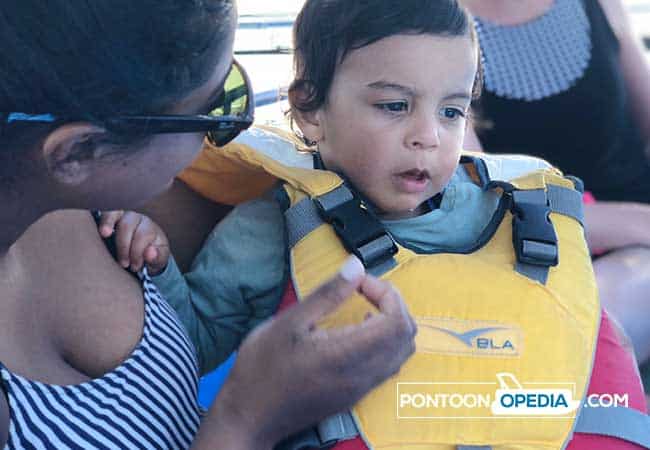
Don’t forget the life jackets! These are just as important as your pontoon boat camping enclosure.
However, if you do decide to buy, opt for something with three buckles that go across your torso. Ours have a nylon shell which is durable yet comfortable on your body. The sides are left open so you can enjoy all sorts of activities on your pontoon boat without feeling restricted. Inside, PE flotation foam keeps you buoyant.
8. Space heater
When you camp at night from your pontoon boat, things can get very cold, very quickly. The air temperature more closely matches the water temperature.
Stay warm with this space heater on Amazon. It’ll warm up the deck quickly and won’t take up too much room onboard, either. It measures 6.2 inches by seven inches by 9.2 inches and doesn’t need an outlet to run.
Warm yourself up with two heat settings, either 750 watts or 1,500. Should you wake up too hot, a cool blow fan feature will get your body temperature back down.
Handy Hint: If you want more gear recommendations take a look at my pontoon boat gear page. It contains every single product we use on our own boat each year.
9. Beach anchor
If camping on on near a beach, you will need an adequate anchor. Check out the two guides below for everything you need for a successful beach camp.
10. Grill for cooking
And lastly, what pontoon boat camping trip would be the same with a grill to barbeque some great tasting food? I am a massive grilling fan and have multiple guidance on Pontoonopedia about how I do it. Here’s some simple advice you can’t do without:
- The best pontoon boat grills
- Recipe ideas for pontoon boat camping
- Food to take on a pontoon camping trip
Tips for a successful pontoon camping trip
While you want every pontoon boat camping trip to go optimally, that won’t happen without the right preparations. Yes, part of it is having the items I talked about above, but you can also ready yourself by following these tips and advice.
1. Expect cold temperatures
You could be camping in the middle of the summer, but once the sun goes down and you’re close to the water, you’ll start shivering unless you’re properly dressed. That’s because as you get nearer water, the air temperature begins to more closely mirror the water temperature.
Let’s say it’s 80 degrees Fahrenheit by day, or an average summer day. As night falls, the temps dip down to 73 degrees. The water temperature is 60 degrees, so the air temperature would be closer to 60 than 70 degrees. That can be a big difference when you’re sleeping on a boat all night.
Even if you decide to camp out on land, since you’re still in very close proximity to the water, the air temperature will be cooler than it would be by your car or at home.
Make sure you bring a heavy blanket, a thick sweatshirt, heavier pants and socks, and whatever else you need.
Once the morning sun greets you the next day, it’ll still be cool on the water for the first few hours of daylight. Maybe close to midday it will warm up, so have warmer weather clothes too if you’re still on your pontoon boat at that point.
2. Bring more water than you think you need
Unless you have some sort of device that will convert river or lake water into potable water, then you need to bring your own H2O. Think of how much water you drink in an average evening and then bring at least twice that. If you have another passenger on board, then double their water quantities as well.
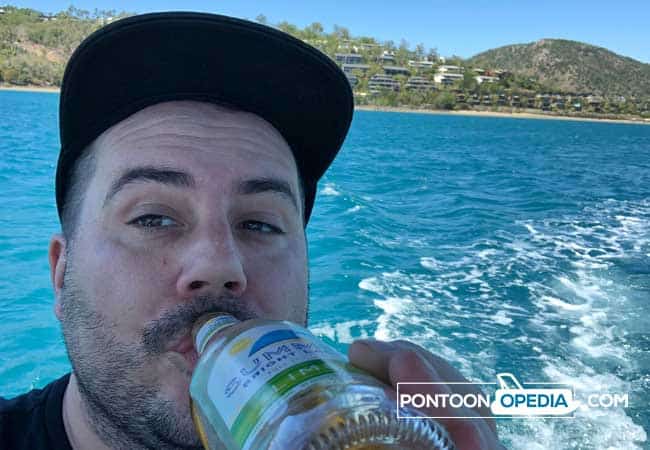
Beer is good, but water is much more important!
You don’t want anyone to have to go without water, as they risk becoming dehydrated. It’s better to have than have not in this case.
3. Triple check your pontoon boat camping accessories
Have you ever been in the car on your way somewhere only to remember a few blocks down the road that you forgot something you needed? You then have to turn around and go fetch the item, wasting time (and gas).
Well, you don’t get that luxury on a pontoon boat. Once you set sail, you can’t easily or quickly get back to land. For that reason, we recommend you double-check then triple-check that you have all the essentials you need for your overnight camping excursion.
4. Study the weather like a hawk
We’re not saying to become a weatherman or weatherwoman overnight, but you do want to know the exact predicted forecast.
Download an app on your phone and track the weather by the hour, but don’t wait until you’re on your boat to do this. Your pontoon may not offer the greatest Internet reception, making getting online impossible.
5. Think about what you will be eating
Since you’re only camping out for a night, you don’t have to really worry about dinner. In fact, it’s better if you eat beforehand unless you’re up for a very light, simple kind of meal.
You might want to bring some snacks (here are some boat snack ideas) if you’re the type who eats before bed. Even if you’re not, having food on hand is always good, especially if you have other passengers onboard.
As for breakfast, keep it simple. A pack of bagels is one such option, as are croissants. Granola or cereal bars make a perfect breakfast to enjoy while on your pontoon boat.
If you have a mini fridge, you can stash items like butter or margarine, orange juice, and milk for a more complete breakfast. You can also skip breakfast and eat once you get back to land. Just remember that food is fuel, so if you need it, eat it.
6. Always clean up after yourself
No matter which activities you choose to enjoy on your pontoon boat camping trip, it’s your responsibility to clean up the area around you to the best of your abilities.
Don’t leave trash scattered and strewn on your pontoon deck, as the wind can carry it up and into the water. If you’re sleeping on land for the night, again, avoid making a mess.
You wouldn’t want anyone else to ruin your camping experience with junk. Don’t do the same to them.
7. Remember it’s just one night
If you’ve never slept under a pontoon camping enclosure before, it’s easy to get a little overzealous in your planning. You might think you need this, that, and the other thing, and so you pack way too much.
You’re only camping for one night. Most of the time you’ll be on your boat, you’ll be asleep. A change of clothes is good, as are all the essentials we listed in the intro.
Food and snacks? Entertainment? Great! Everything but the kitchen sink? You can probably afford to leave most of it at home.
Not only is it more convenient for you since you have to pack less, but being a lighter traveler is for everyone’s safety. Pontoon boats, like any other vessel, have weight requirements.
Your captain will distribute weight in such a way that’s safe for everyone, but an overly heavy bag could disturb that weight distribution. This puts pressure on one side of the boat.
While pontoon boats are one of the least likely vessels to capsize, you don’t want to personally test that theory.
8. Don’t forget the fun and games
We have kids, so know what it’s like to try and keep them entertained for hours on end. Whilst the first hour or so of your pontoon camping experience will be new to them, the novelty soon wears off.
Here are some pontoon boat camping ideas you can add in to your trip to keep the kids occupied:
What not to do when pontoon boat camping
As you continue your preparations, make sure you avoid these common pontoon boat camping pitfalls.
1. Ignore the weather warnings
You told all your buddies you were going to camp out on your pontoon boat next Saturday night. The weather looked clear when you made the plans the week before, but as Saturday comes close, the forecast changes. Now it’s going to pour all night.
Still, you’d hate to disappoint your friends, so you figure you’ll go through with the trip anyway. What’s a little bit of rain, right? It’s not like pontoon boats can capsize anyway, isn’t that what we just said?
Not exactly.
Pontoon boats don’t capsize often, but it can happen. Being careless aboard your boat puts you at a much higher risk of tipping over, as does riding in inclement weather. Even if it’s just rain, downpours can bring with them high winds that make boating unsafe.
Further, the decrease in visibility from the pelting rain doesn’t help, either. You could hit something or even another boat accidentally.
2. Leave your life vests at home
Life vests aren’t just a trendy accessory you could skip if you wanted to. The US Coast Guard mandates that you have one when boating. These vests are known as personal flotation devices, which are divided into five types. Well, one type isn’t wearable, as it’s a throwable flotation device.
The other four types of personal flotation devices are separated into different classes depending on the kind of water-based activities you’re doing. If you’re riding in rough waters, you’d need a Type I life vest.
In more relaxed waters, Types II and III suffice. For activities like kayaking, waterskiing, and windsurfing, Type V life vests are recommended.
Each passenger on your pontoon boat must have access to a life vest. It’s not mandatory they wear them the entire time, although the rules vary somewhat for children depending on which part of the boat they’re on.
Personal flotation devices save lives. Never leave land without them.
3. Have too many happy campers
Remember in the last section how we talked about weight distribution? It’s seriously, seriously important that you keep the weight down on your pontoon and don’t overload with people.
Your boat will have a recommended weight limit, and you should stay within that give or take 20, maybe 50 pounds. Many pontoon boat manufacturers even tell you the max amount of people you can bring on your boat.
As soon as you exceed that limit, you’re boating dangerously. Don’t do it.
Should you camp on your pontoon boat or dry land?
And lastly, what’s best; camping on your boat, or pitching a tent on the beach?
Would you like to get the true, authentic experience of camping aboard your pontoon boat by sleeping on the boat? Perhaps you’d rather moor your boat and sleep somewhere close. Which is better?
I can’t tell you which option to pick but we do both. It will all come down to personal preference.
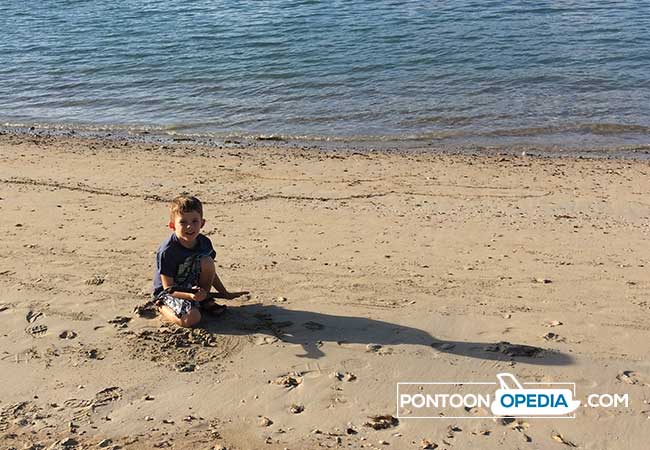
If you do decide to camp on the beach it will keep the kids entertained for longer!
For instance, do you like the gentle rocking of the water? Will that help lull you off to sleep? Some people might say yes, that the feel of the water as it crests and moves is Mother Nature’s way of sending you off to dreamland.
Others might not like the constant motion, as it distracts them from getting quality rest. After all, your bed back home doesn’t move like that.
If do decide that sleeping off your boat is the best option, you must ensure your pontoon is securely anchored. Otherwise, it could drift away while you’re catching up on your Zzzs. In the morning, you’d wake up with your boat several feet out further than where you last left it!
Also, if you do decide to sleep somewhere near your boat, just check that you have the clearance to do so. On that note, get in touch with your Coast Guard or the authority at your local lake/river and confirm that you can sleep on your boat as well.
Conclusion
There are few simpler joys in life than camping on your pontoon boat. Yet before you blindly set out, you want to make sure you have all the supplies you need to get you through a comfortable, fun night.
Some pontoon boaters opt to sleep off their boat on land while others like an enclosure to make snoozing on a boat feel more like home. With so many options, there are countless ways to enjoy a sleepover on or near your pontoon boat.
If you don’t think camping it rough is for you, then you might want to consider buying a pontoon that is actually set up for sleeping on. Here are some ideas of ones which come with cabins.
I hope you’ve enjoyed these pontoon boat camping ideas, and if you do buy a camping enclosure this year get all the value you can get from it!
Have fun and be safe!

